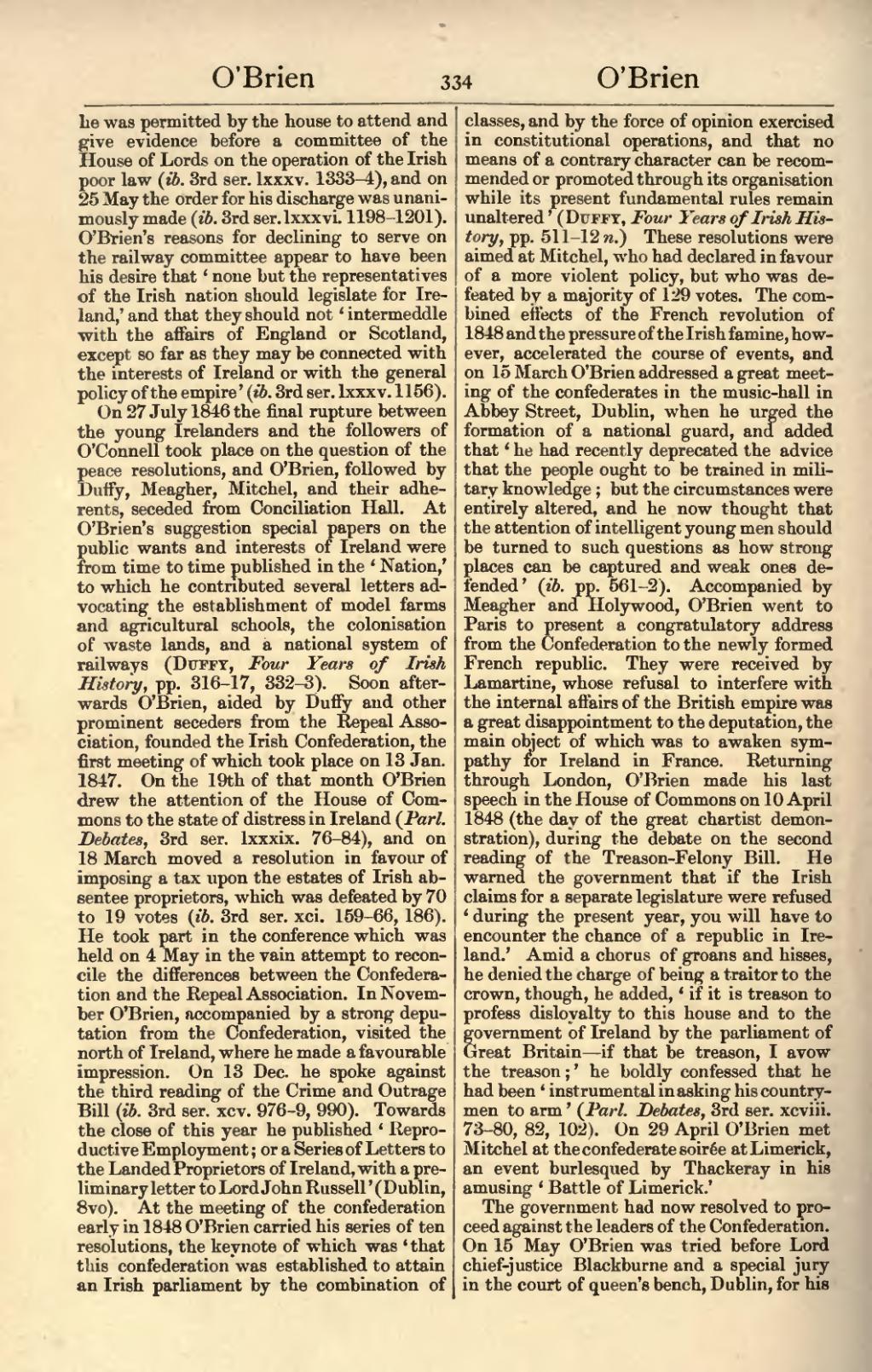he was permitted by the house to attend and give evidence before a committee of the House of Lords on the operation of the Irish poor law (ib. 3rd ser. lxxxv. 1333–4), and on 25 May the order for his discharge was unanimously made (ib. 3rd ser. lxxxvi. 1198–1201). O'Brien's reasons for declining to serve on the railway committee appear to have been his desire that ‘none but the representatives of the Irish nation should legislate for Ireland,’ and that they should not ‘intermeddle with the affairs of England or Scotland, except so far as they may be connected with the interests of Ireland or with the general policy of the empire’ (ib. 3rd ser. lxxxv. 1156).
On 27 July 1846 the final rupture between the young Irelanders and the followers of O'Connell took place on the question of the peace resolutions, and O'Brien, followed by Duffy, Meagher, Mitchel, and their adherents, seceded from Conciliation Hall. At O'Brien's suggestion special papers on the public wants and interests of Ireland were from time to time published in the ‘Nation,’ to which he contributed several letters advocating the establishment of model farms and agricultural schools, the colonisation of waste lands, and a national system of railways (Duffy, Four Years of Irish History, pp. 316–17, 332–3). Soon afterwards O'Brien, aided by Duffy and other prominent seceders from the Repeal Association, founded the Irish Confederation, the first meeting of which took place on 13 Jan. 1847. On the 19th of that month O'Brien drew the attention of the House of Commons to the state of distress in Ireland (Parl. Debates, 3rd ser. lxxxix. 76–84), and on 18 March moved a resolution in favour of imposing a tax upon the estates of Irish absentee proprietors, which was defeated by 70 to 19 votes (ib. 3rd ser. xci. 159–66, 186). He took part in the conference which was held on 4 May in the vain attempt to reconcile the differences between the Confederation and the Repeal Association. In November O'Brien, accompanied by a strong deputation from the Confederation, visited the north of Ireland, where he made a favourable impression. On 13 Dec. he spoke against the third reading of the Crime and Outrage Bill (ib. 3rd ser. xcv. 976–9, 990). Towards the close of this year he published ‘Reproductive Employment; or a Series of Letters to the Landed Proprietors of Ireland, with a preliminary letter to Lord John Russell’ (Dublin, 8vo). At the meeting of the confederation early in 1848 O'Brien carried his series of ten resolutions, the keynote of which was ‘that this confederation was established to attain an Irish parliament by the combination of classes, and by the force of opinion exercised in constitutional operations, and that no means of a contrary character can be recommended or promoted through its organisation while its present fundamental rules remain unaltered’ (Duffy, Four Years of Irish History, pp. 511–12 n.) These resolutions were aimed at Mitchel, who had declared in favour of a more violent policy, but who was defeated by a majority of 129 votes. The combined effects of the French revolution of 1848 and the pressure of the Irish famine, however, accelerated the course of events, and on 15 March O'Brien addressed a great meeting of the confederates in the music-hall in Abbey Street, Dublin, when he urged the formation of a national guard, and added that ‘he had recently deprecated the advice that the people ought to be trained in military knowledge; but the circumstances were entirely altered, and he now thought that the attention of intelligent young men should be turned to such questions as how strong places can be captured and weak ones defended’ (ib. pp. 561–2). Accompanied by Meagher and Holywood, O'Brien went to Paris to present a congratulatory address from the Confederation to the newly formed French republic. They were received by Lamartine, whose refusal to interfere with the internal affairs of the British empire was a great disappointment to the deputation, the main object of which was to awaken sympathy for Ireland in France. Returning through London, O'Brien made his last speech in the House of Commons on 10 April 1848 (the day of the great chartist demonstration), during the debate on the second reading of the Treason-Felony Bill. He warned the government that if the Irish claims for a separate legislature were refused ‘during the present year, you will have to encounter the chance of a republic in Ireland.’ Amid a chorus of groans and hisses, he denied the charge of being a traitor to the crown, though, he added, ‘if it is treason to profess disloyalty to this house and to the government of Ireland by the parliament of Great Britain—if that be treason, I avow the treason;’ he boldly confessed that he had been ‘instrumental in asking his countrymen to arm’ (Parl. Debates, 3rd ser. xcviii. 73–80, 82, 102). On 29 April O'Brien met Mitchel at the confederate soirée at Limerick, an event burlesqued by Thackeray in his amusing ‘Battle of Limerick.’
The government had now resolved to proceed against the leaders of the Confederation. On 15 May O'Brien was tried before Lord chief-justice Blackburne and a special jury in the court of queen's bench, Dublin, for his
